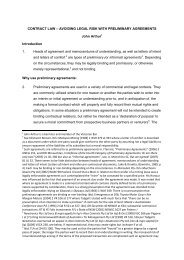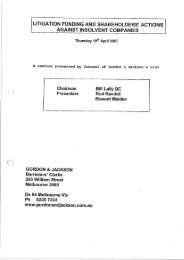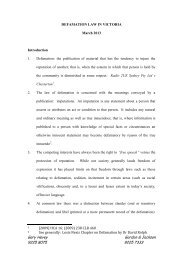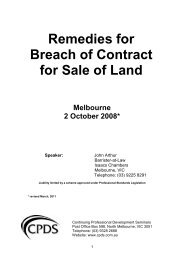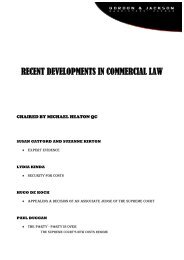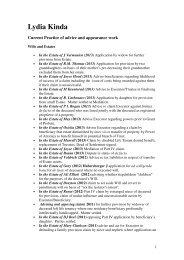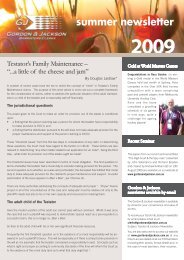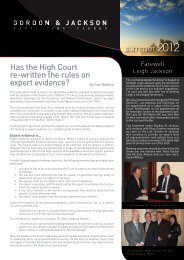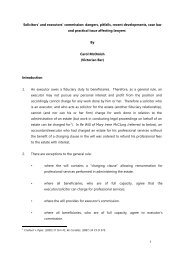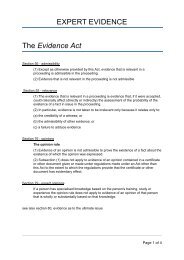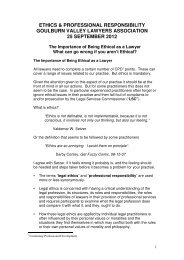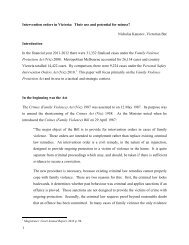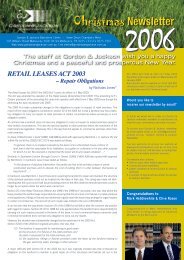Enforcing Rights & Remedies under a Contract for the Sale of Land
Enforcing Rights & Remedies under a Contract for the Sale of Land
Enforcing Rights & Remedies under a Contract for the Sale of Land
Create successful ePaper yourself
Turn your PDF publications into a flip-book with our unique Google optimized e-Paper software.
3.1.2 It should be noted at this point, that where time is <strong>of</strong> <strong>the</strong> essence <strong>of</strong> <strong>the</strong><br />
contract, each party is bound to per<strong>for</strong>m his or her obligations<br />
<strong>the</strong>re<strong>under</strong> strictly in accordance with its terms and failure to do so will<br />
constitute a breach entitling <strong>the</strong> o<strong>the</strong>r party to rescind <strong>the</strong> contract at<br />
once. In Victoria, time stipulations have <strong>for</strong> many years been made<br />
essential by Clause 5 <strong>of</strong> <strong>the</strong> now repealed Table A <strong>of</strong> <strong>the</strong> Seventh<br />
Schedule <strong>of</strong> <strong>the</strong> Transfer <strong>of</strong> <strong>Land</strong> Act 1958 (Vic.) (subject to <strong>the</strong> notice<br />
to remedy provision in Clauses 5 and 6 <strong>the</strong>re<strong>of</strong>) 16 . The position is<br />
similar since <strong>the</strong> introduction <strong>of</strong> <strong>the</strong> new standard contract <strong>of</strong> sale <strong>of</strong><br />
real estate which is Forms 1 and 2 in <strong>the</strong> Schedule to <strong>the</strong> Estate<br />
Agents (<strong>Contract</strong>s) Regulations 2008 17 . While time is made <strong>of</strong> <strong>the</strong><br />
essence <strong>of</strong> <strong>the</strong> contract (GC16.1), <strong>the</strong> right to rescind, or bring <strong>the</strong><br />
contract to an end, is subject to giving a written default notice (GC<br />
27.1) which specifies certain matters (GC 27.2 and 28.2) 18 . If time has<br />
ceased to be <strong>of</strong> <strong>the</strong> essence, <strong>the</strong> purchaser will first need to serve a<br />
notice making time <strong>of</strong> <strong>the</strong> essence and <strong>the</strong>n rescind.<br />
3.1.3 Rescission in this sense may take place in many situations including<br />
<strong>the</strong> following:<br />
(a) vendor unable to deliver vacant possession 19 ;<br />
(1933) 48 CLR 457 at 476-477 and ibid, Meagher Gummow & Lehane para. 2401<br />
16 The Seventh Schedule to <strong>the</strong> Transfer <strong>of</strong> <strong>Land</strong> Act 1958 (Vic) was repealed by <strong>the</strong> <strong>Land</strong> Legislation<br />
Amendment Act 2009, No. 80/2009, s. 71. However <strong>under</strong> s. 130 Transfer <strong>of</strong> <strong>Land</strong> Act 1958 (as amended)<br />
on and from <strong>the</strong> commencement <strong>of</strong> s. 71 <strong>Land</strong> Legislation Amendment Act 2009, any reference to Table<br />
A <strong>of</strong> <strong>the</strong> Seventh Schedule to this Act in a contract is to be taken to be a reference to Table A <strong>of</strong> that<br />
Schedule as in <strong>for</strong>ce immediately be<strong>for</strong>e its repeal (<strong>the</strong> said section commenced on 1 May, 2010). This<br />
provision allows those that wish to, to continue incorporating Table A into contracts <strong>for</strong> sale <strong>of</strong> land.<br />
17 In <strong>the</strong> second reading speech to <strong>the</strong> <strong>Land</strong> Legislation Amendment Bill, Mr Batchelor, Minister <strong>for</strong><br />
Community Development, 2 September 2009, Assembly, p. 2983 stated “<strong>the</strong> bill repeals .. table A <strong>of</strong> <strong>the</strong><br />
seventh schedule, which prescribe general conditions <strong>of</strong> sale. In 2008 <strong>the</strong> Estate Agents (<strong>Contract</strong>s)<br />
Regulations 1997 were reviewed, creating a new standard contract <strong>of</strong> sale <strong>of</strong> real estate. In developing<br />
<strong>the</strong> new contract, <strong>the</strong> principle that contracting parties should have all <strong>the</strong> terms and conditions <strong>of</strong> <strong>the</strong><br />
agreement be<strong>for</strong>e <strong>the</strong>m when <strong>the</strong> contract is created was applied. The new contract replaces <strong>the</strong> table A<br />
conditions altoge<strong>the</strong>r. However, many <strong>of</strong> <strong>the</strong> conditions <strong>of</strong> sale contained in <strong>the</strong> standard contract have<br />
been derived from table A and modernised <strong>for</strong> contemporary usage. The new contract has been adopted<br />
as <strong>the</strong> industry standard, so <strong>the</strong> outdated conditions in table A are now redundant”. Despite <strong>the</strong><br />
introduction <strong>of</strong> <strong>the</strong> new contract, it is <strong>under</strong>stood that Table A continues to be utilized by some in <strong>the</strong><br />
industry, and see note 16. In relation to <strong>the</strong> new <strong>for</strong>m <strong>of</strong> contract, see see Fast and friendly: The 2008<br />
contract <strong>of</strong> sale <strong>of</strong> land by Russell Cocks, David Lloyd, Murray McCutcheon (2008) 82(10) LIJ, p. 40;<br />
Property: <strong>Contract</strong> <strong>of</strong> sale tweaked by Russell Cocks, Jan/Feb 2012 86(1/2) LIJ, p.84<br />
18 Similar to what clauses 5 and 6 <strong>of</strong> Table A <strong>for</strong>merly required<br />
19 Wroth v Tyler [1974] Ch 30; [1973] 1 All ER 897; [1973] 2 WLR 405; Precision Fabrication Pty Ltd v<br />
Roadcon Pty Ltd (1991) 77 NTR 1 at 8; 104 FLR 267 at 273; Malhotra v Choudhury [1980] Ch 52 at 71;<br />
[1979] 1 All ER 186; Sharney<strong>for</strong>d Supplies Ltd v Edge [1987] Ch 305; [1987] 1 All ER 588; [1987] 2 WLR 363<br />
but note <strong>the</strong> purchaser will not be entitled to treat <strong>the</strong> contract as no longer binding on him be<strong>for</strong>e <strong>the</strong><br />
time <strong>for</strong> completion has arrived unless it is quite clear that <strong>the</strong> vendor has no title to <strong>the</strong> property sold or<br />
to a material portion <strong>of</strong> it, or that his only title is contingent on <strong>the</strong> volition <strong>of</strong> a third person: Bell v Scott<br />
6



